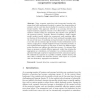49 search results - page 2 / 10 » Negotiation decision functions for autonomous agents |
ATAL
2005
Springer
14 years 29 days ago
2005
Springer
The modularization of negotiating agents as proposed by the C-IPS approach provides a sound base for a concept that we call dynamic degrees of delegation. Agents following this co...
AI
2002
Springer
13 years 7 months ago
2002
Springer
Automated negotiation is a key form of interaction in systems that are composed of multiple autonomous agents. The aim of such interactions is to reach agreements through an itera...
TSMC
2002
13 years 7 months ago
2002
Existing modeling frameworks for manufacturing system control can be classified into hierarchical, heterarchical, and hybrid control frameworks. The main drawbacks of existing fram...
GAMESEC
2010
13 years 5 months ago
2010
Abstract. Many computer protection tools incorporate learning techniques that build mathematical models to capture the characteristics of system's activity and then check whet...
ATAL
2005
Springer
14 years 29 days ago
2005
Springer
In many negotiation and bargaining scenarios, a particular agent may need to interact repeatedly with another agent. Typically, these interactions take place under incomplete info...

